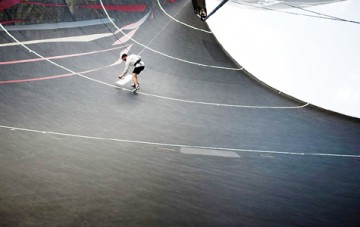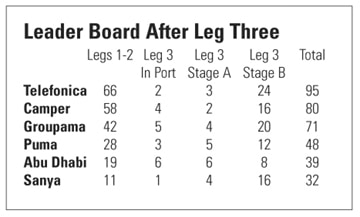13 Days of Non-Stop Mayhem
When we last checked on The Volvo Ocean Race, the 15-ton, 70-foot-long boats were safely in Abu Dhabi — after hopping a stealth freighter to avoid pirates in the Indian Ocean. Leg 3 begins with the usual in-port race in Abu Dhabi, home of the boat in second-to-last place, and continues to Sanya, China, home of the boat in last place.
An Arabian fairy tale came true as British Olympian Ian Walker skippered hometown favorite Team Abu Dhabi to victory in the Etihad In-Port Race. Walker’s risk paid off in the winds of the Persian Gulf, earning his boat its second in-port victory in three races so far. The next day, the Shamal Winds came rolling in from the desert.
Race leader Telefonica looked to continue its winning ways, dominating the 106-mile race along the coast of the Arab Emirates. Then, with only two miles to go, the crew of old hands of Abu Dhabi pulled another rabbit out of the hat. Abu Dhabi’s black, falcon-crested boat known as Azzam (Determination) — a radically designed racer by Bruce Farr of Annapolis — sailed to a one-minute victory over the hard-luck boys on Puma, taking the first stage of Leg 3 to Sanya, China.
Then it was back into the box.
The fully rigged boats were reloaded at Sharjah onto the yellow security freighter and transported to a mystery isle deep in the Indian Ocean (the Maldivian port of Male). Unloaded, they sailed away without fear of capture by pirates.
Snake-bit Team Sanya rejoined the fleet for the second stage. While the fleet was resting, racing and retooling in Abu Dhabi, the Chinese boat had been re-rigging in Madagascar since early in Leg 2. Bad luck throughout the fleet had been such that all six Volvos were now reunited for the first time since the race began in Alicante, Spain.
Let’s Put Leg 3 in Perspective
Each leg of the Volvo Ocean Race is a long-running drama of complex acts. Leg 3 was no exception.
Act 1 was a 1,000-mile straight line, sweltering burn-run on port tack, sailing south of Sri Lanka and across the Bay of Bengal toward the waypoint at Pulau We, off the coast of Indonesia. The first night out, Telefonica’s Code Zero headsail ripped and the boat fell to the back of the fleet. Having nothing to lose, Telefonica went north while all the others sailed east. Puma and Camper traded leads daily — only to see Telefonica scream in from the north a few days later and steal the show.
After damage in the first two legs forced Team Sanya to withdraw, the crew of the Chinese boat hoped to make a good showing in Leg 3, which ends in its home port. But it’s clear their boat, Telefonica Blue from the last Volvo Ocean Race, simply cannot compete with the latest generation of Volvo boats. That doesn’t mean Team Sanya can’t get lucky and have a gamble pay off. But over the long haul the Chinese boat is way over-matched.
Act 2 restarted near the entrance to the Malacca Strait at the northern tip of Sumatra. Lead boats hit light winds while the boats at the back rode a stronger breeze to catch up. No lead is ever safe. That’s one of the maddening aspects of long-distance sailboat racing.
 |
The Malacca Strait is a narrow, 500-mile-long channel filled with freighters, fishing boats, drift nets, uncharted reefs, unpredictable winds and a surreal assortment of floating debris. Puma hit a big tree that busted a dagger board. After clawing back into the lead, the boat snagged a fishing net and dropped to third. It was like sailing through a video game where everything is out to get you.
Puma’s navigator Tom Addis set the stage. “There’s plenty to hit, sandbanks and wrecks, the weather is really unstable — and through all of that you still have to rest so you can remain sane and make good decisions.”
In three days of dueling lead changes, Team Abu Dhabi tore a sail and Camper got parked under a windless cloud. Thus ended both of their chances to win Leg 3. Act Two ended as it began, with Telefonica pin-balling out the Singapore side of the Malacca Strait in first, followed 20 minutes later by Groupama, sailing with the rest of the fleet this leg. Puma followed, seven miles back.
Gales and Jackhammer Waves

Act Three began with a bang as the fleet battled the 35-knot, gale-force winds and the 12-foot jackhammer waves of the South China Sea. Leaving Malaysia to starboard, the fleet began the dangerous 1,000-mile upwind odyssey, dodging rocky reefs and floating landfills.
The original plot line, based on the winning strategy of the last Volvo Ocean Race, was to hug the coast of Vietnam and use it as a shield from wind and current. This final stage of Leg 3 was all about survival and sailing as fast as possible without breaking the boat.
But after a few days of playing catch-up in third, Puma tested the fates by sailing east into an area known as the Dangerous Ground, daring the rest of the fleet to come out and play. No one took the bait, and the wind gods hit Puma with a granddaddy header that pushed the boat back to Vietnam and into a disappointing fourth position.
After 13 days of non-stop mayhem, Leg 3 ended with a bone-crushing tacking duel across Sanya Bay that pushed the exhausted crews to their limits.
Telefonica took line honors for the third consecutive Leg. The only other boat to win the first three legs of the Volvo Ocean Race is Sir Peter Blakes’ Steinlager 2 in 1989-’90.
Next Stop: Auckland, New Zealand.
Between Carr’s reports, follow the race at volvooceanrace.com/en/home.html.
